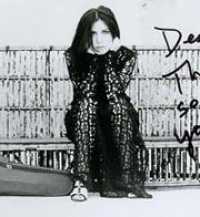"I had a dream when I was eight that I could play violin," recalls Lili Haydn.
In the seventeen years since that revelation, the young violinist has cultivated a talent that took root in classical training and blossomed among pop music's elite manifesting itself in her self-produced Atlantic debut entitled Lili. Hand-in-hand with that evolution has been Lili's desire to connect with a universal spirituality through her music.
As Lili's study of the Kabalah taught her, "music is the only expression which allows the soul to be lifted from within the empty space." Her heartfelt dedication to that precept is communicated through probing lyrics and a dynamic, inspired violin and vocal performance in both her live shows and on her album.
Before delving into her own project, though, Lili played and recorded with a number of acts whose diversity and acclaim speak to the uniqueness of her craft: L.A. Philharmonic, the Rolling Stones, Robert Plant and Jimmy Page, Tony Toni Tone, Porno For Pyros, B.B. King, No Doubt, Hootie & The Blowfish, Chaka Khan, Nusrat Fateh Ali Khan, Bush, Tracy Chapman, Tom Petty, Me'Shelle N'dege O'cello, and the list sprawls on.
"I jumped on every stage that would have me. My thirst for performing was insatiable. When I first started to play with people, it was like getting to kiss everybody that I wanted to kiss in the whole world," says Lili. "I remember my mother calling me a 'jam slut,' and it was true."
Arriving at that place was also a result of some interesting choices and a lot of hard work. As a child actor in several network TV series, Lili gained first-hand knowledge of the entertainment industry and used the money she earned to pay for college at Brown University where she graduated with a bachelor's degree in Political Science.
When she ventured out as a solo artist, the passionate, driven Lili again took a very do-it-yourself approach; this time combining her romantic classical influences of Tchaikovsky and Brahms with the groove of Stevie Wonder and the grunge of Soundgarden. A seemingly impossible task, Lili mastered it almost every Sunday beginning in 1994 during her year-long residency at L.A.'s Viper Room. Lili Haydn and her band featured both Lili's violin and her vocals while backed by two cellos, bass, guitar, drums, percussion and keyboard. The show was part mysticism and part rock concert laced with what Rolling Stone recently called an "impassioned mix of classical, punk, funk, and pop," and it kept her devoted, ever-growing audiences entranced week after week.
For Lili, the genre of music is far less important than its artistry. And art, in her definition, must not only challenge but have soul and emotion. "I do believe that music has the capacity to lift people's spirits in a way that can make their lives better," says Lili.
That belief is evident in her work on songs such as "Faithful One," with its touching lyric, "where is God, o faithful one/In struggle lies evolution/Where is God, o faithful one/He's all you have, he's what you become." It's also the reason that, despite the amazing contributions made by her friends in the music community, she felt compelled to produce her own record.
That vision, while molded by her own experiences, has been reaffirmed by the lives of other artists such as her hero Nusrat Fateh Ali Khan. "He's completely divine." says Lili of the legendary Pakistani Qawwali singer.
It's clearly a quality Lili admires more than almost anything. It's what keeps her moving forward, and with regards to Lili, allowed her to fervently express, as she says, "the angst and the sweetness, the fragile and the ferocious."
